Easter Eggs At Seventh Heaven
Easter eggs at Seventh Heaven
OG Seventh Heaven and AC Barret, Marlene and Red XIII

AC Seventh Heaven

Remake concept art of the bar

Original Seventh Heaven

More Posts from Terra-fatalis and Others
Info (in case anybody cared...)
I’ll soon delete my other account https://stargazerobservatory.tumblr.com/ . It’s another FFVII blog that was meant to include only lore-related posts, while this one was dedicated to my fangirling rants lol. Since I haven’t used that account for a long time and I’m actually posting much more stuff here, I’ll regroup/reblog/rewrite the posts I have there under a single account.
Photo mode allows the player to restore the true colors of Elmyra's flashback.
As it turns out, when Elmyra adopts Aerith the ribbon is green.

(image source)
Aerith's ribbon: is it still a gift from Zack?
It has been rumored by some fans that the Crisis Core scene where Zack gave Aerith the pink ribbon is no more canon, because kid Aerith has a pink ribbon too.
I don't mean to sound pretentious but...they're evidently different. Kid Aerith's ribbon has four ends, adult Aerith's ribbon has just two.

Since the original FFVII kid Aerith's had two outfits. She wore the blue outfit in the first part of Elmyra's flashback and the orange one when Tseng tried to convince her to return to Shinra.

In the Remake she wears the orange outfit only in the train graveyard vision and the blue one in all of Elmyra's flashback, from the moment she found her at the station up to when Tseng showed up. It's definitely not very evident because of the sepia tone filter, but we can compare her dress to the concept art and to the orange dress: she has no ribbon on the chest but wears a pinafore dress and a light shirt with bell sleeves.
This means that in the sepia toned scene she was wearing the green ribbon, as we can see from the concept art.
The scene at the train graveyard bears many similarities with the situation described in Picturing the Past, so she was wearing the orange outfit before escaping Shinra HQ.
When Elmyra found her and brought her in Sector 5 she had the green ribbon, not the pink one.

Someone tried to say Aerith stated the ribbon was a gift from her mother when she met Cloud at the church...
Nice try, but she was talking about White Materia. (Leaving a couple of links in case anybody wanted to check: OG, Remake)

So, not only there's no evidence that the pink ribbon is no more Zack's gift but that scene influenced also an important moment of the Remake: Aerith and Cloud's first encounter.

And in both cases the gift was made in order to thank the other for their help
CC: To show you my gratitude for that "hello" that woke me up.
Remake: You know, for scaring those things away.
Ehhh...can I say what a coincidence again?
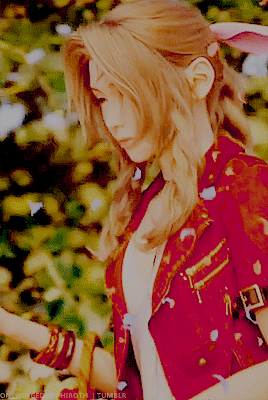
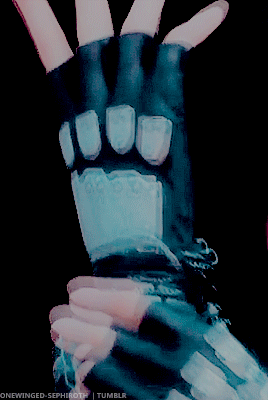
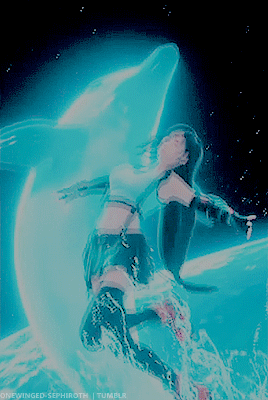
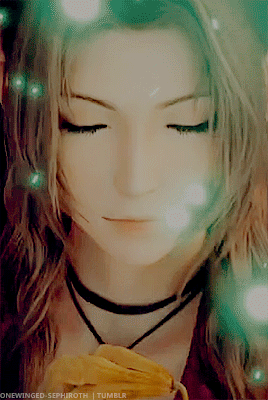
AERITH & TIFA CG IN BRAVE EXVIUS
Hi, thank you for your brilliant insights. Maybe it's just a coincidence of the English localization, but do you think there is any thematic relation between Cloud and Tifa's Promise and the Promised Land? (meaning the PL as a state of enlightenment and fulfillment, and considering the Promise with all it's consequences in the story, not just as two separate elements)
I have to be honest here about the limits of my knowledge. I don't speak Japanese so I don't feel comfortable making a hard conclusion about that. That having been said, I believe so yes. As far as I can tell "the promised land" is a pretty literal translation of Yakusoku no ji (約束の地)
Yakusoku (約束) literally meaning promise, "no"(の) meaning "of" and "ji" (地) literally translating to ground or earth. Personally I highly doubt that that would be an accident, and I think the meaning is pretty clear. If we look at the concept of the promised land as a state of supreme bliss, then it doesn't take a rocket scientist to figure out how that might apply to Clouds case. The core desire of true Cloud was to be capable of protecting people, specifically Tifa, his failure to do so is what leads to his fake persona and eventual AC depression. "The promise" is in itself something that is highlighted as being of special significance both inside the game and out. It's routinely mentioned in Ultimania, and if you remember back to the FFVII:remake announcement it also had the line "the promise has been made". The promise, reunion, the promised land, these things are all more significant than just words, they're returning concepts that have had real thought put into them by the developers. Concerning the promise, it is all about protecting Tifa, which is Clouds deepest desire, it is his state of happiness, to be the hero Tifa can depend on. When Tifa and Cloud enter the lifestream together, Cloud returns to his true self, and along with that realization comes the reveal that Cloud did come for Tifa, he fulfilled his promise, not as a soldier, but as his own flawed human self. Through his return to his true self, he fulfills his promise, thereby reaching his desired state of being, which then directly leads into his coming together with Tifa underneath the highwind. Sometimes I find myself thinking "what if this is all a happy coincidence, what if SE simply struck thematic gold without realizing it?", but this is one of the cases where I think it's just too perfect for it not to be consciously intended. In one fell swoop Cloud fulfills his promise, breaks through his fake self, obtains the inner power needed to vanquish the external threat, obtains that which he has been seeking, together with the girl named after the sefira of balance between strength and beauty? A girl who lives at the 7th heaven. Who is also thematically linked to Valkyries, aka, the lovers of heros?
No, that's all too big of a coincidence, I know I said I didn't want to make too definite of a conclusion, but I feel like these things have to have been by design. If they weren't, I wouldn't just be shocked, I'd be disappointed.
Midgar Blues ♥

Oh Midgar, Midgar, city that's always on my mind For Midgar, Midgar, I left my one true love behind Snuck outta the town before the sun could rise — when I knew you'd be sleeping Could barely read the words on my carriage ticket — non-stop to Midgar Our parting words never said, only to be washed away Swept up and lost in the stream of life I can't see the stars no more — but they still fall In the plate's reflection, that night summer sky from our youth You and me girl — watching and wishing We both burned so very bright — brighter than the sun Yet we played it too cool, never making a move How our hearts raced so fast, we could hear them beat Electricity — oh how the sparks would fly Oh Midgar, Midgar, city that's always on my mind For Midgar, Midgar, I left my one true love behind
Tifa’s journey and resolve
As we’ve previously discussed, when Tifa first discovered Cloud at the train station, she found herself faced with a dilemma: she could heedlessly tell Cloud what she knows and risk losing him physically or mentally; or she could build up her resolve and wait for the opportune moment to tell him, hoping that with proper timing, she’d be able to tell him without losing him. Tifa chooses the latter.
Tifa wrestles with her secret across Midgar, Kalm, Gongaga, and Cosmo Canyon, but her worries finally push her over the edge at Gold Saucer’s Ghost Hotel. While Red XIII worries that he may go mad, Tifa is the only one who realizes that this is likely what is happening to Cloud; that Cloud may very well be going mad already. In her fear, Tifa snaps:

Red XIII: Cloud… I’m number 13. Am I going to go mad too?
Tifa: I don’t know what Hojo did to you, but you’ve been all right so far, right?
Red XIII: But…
Tifa: Be strong.
Red XIII: But, I…
Tifa: Stop it, Red XIII! Be strong!
Cloud: Tifa?
Tifa: You’re not the only one who’s worried!
(Source)
This uncharacteristic outburst convinces her. She has to talk to Cloud–and if she can’t find the opportune moment, she’ll make one.
So… she asks Cloud out on a date.
And the opportune moment reveals itself on the gondola:

Tifa: Ok, I’m going to just go ahead and say it…
Cloud: …what?
Tifa: Aeris would be able to just come out and say it, probably. Cloud… Sometimes being old friends is hard. I mean, timing is everything.
Cloud: Yeah…
Tifa: Cloud…? I……
Tifa: ………………….
(Source)
The gondola script looks like an attempted romantic confession–but much like everything else pre-Lifestream, looks can be deceiving. Given Tifa’s earlier emotional outburst, it’s far likelier that her words are hinting at her worries. But regardless of the interpretation, as “Interrupted by Fireworks” swells in the background, Tifa can only think of one thing: “I need to tell him.” Be it her doubts or her affections, could it be that now is finally the right time?
Surrounded by the flash and glitter of the Gold Saucer, Tifa hesitates… and before she knows it, the ride is over. Tifa lacks the confidence and resolve to be open with Cloud, and she allows the opportune moment to slip through her fingers.

Like Tifa said, timing is everything, and she never gets an opportunity like this again. As soon as they get off the gondola, Cait Sith’s actions set off a rapid-fire chain of events that culminates at the Norther Crater.
And suddenly, all of Tifa’s worst fears are realized. She loses Cloud mentally. She loses Cloud physically. He is gone. All of her careful, calculated efforts were for naught. Tifa is left bereft and depressed.
Which brings us to Mideel:

Tifa: What’s the matter? Are you all alone?
(dog whimpers)
Tifa: You got lost didn’t you? Separated from someone you love? Silly thing…
(Source)
This moment is huge for Tifa. This is the first time she is able to articulate, even indirectly, any of the thoughts locked away in her heart. Between Northern Crater and this moment, Tifa has changed.
And just in time. Tifa learns that Cloud may be alive and near. Filled with hope, “Interrupted by Fireworks” swells in the background and harks back to that moment on the gondola, when Tifa could only think of one thing: “I need to tell him.” And this time, Tifa is not going to let the moment slip through her fingers.
Final thoughts:
This makes Cloud’s clone status all the more heartbreaking. Just when Tifa thinks that Cloud is safe and she can finally make up for missed opportunities, Cloud is not ready to hear her. Once again she’s lost her chance and she’s lost Cloud. We all know Remake is going to rip our hearts out with this scene.

Damn this doctor is extra af, way to twist the knife (and explain why Tifa stays with Cloud):

“Timing is everything.” Tifa is right–from Cait Sith’s treachery through to Cloud’s clone violence, Tifa never gets the chance to talk to Cloud in private. By the time Cloud wakes up at the Gongaga Inn, his ego is at the brink of collapsing into full Sephiroth Copy mode–and if he got even a hint that Tifa doubts him, his ego would simply collapse sooner, same as it does later at Northern Crater. Tifa senses this, and hopes that fake confidence in Cloud will tide him over. This is also why she asks to stay in the party when the group goes to take on Sephiroth–she wants to keep an eye on him and support him, not just “settle things with Sephiroth.”
“Timing is everything,” reemphasized. Through the Lifestream sequence, we realize that even if Tifa had opened up to Cloud earlier, nothing would have changed–Cloud wasn’t ready to face his own flaws and work resolutely towards the truth with no reservations. The right time really is after Northern Crater and in the Lifestream.
In an upcoming (mostly written!) post I’ll talk more about how “Interrupted by Fireworks” is actually a clever device to subvert our expectations… for both girls. There’s a lot of interesting symmetry that makes the divergences even more striking.
Special shoutout to @janeiteoftheslums who pointed out a detail I missed in the first (extremely short-lived!!) version of this post. Thank you so much! Everyone, if you’re craving some cloti goodness, head on over and read some of her fics.
One thing about fandom culture is that it sort of trains you to interact with and analyze media in a very specific way. Not a BAD way, just a SPECIFIC way.
And the kind of media that attracts fandoms lends itself well (normally) to those kinds of analysis. Mainly, you're supposed to LIKE and AGREE with the main characters. Themes are built around agreeing with the protagonists and condemning the antagonists, and taking the protagonists at their word.
Which is fine if you're looking at, like, 99% of popular anime and YA fiction and Marvel movies.
But it can completely fall apart with certain kinds of media. If someone who has only ever analyzed media this way is all of a sudden handed Lolita or 1984 or Gatsby, which deal in shitty unreliable narrators; or even books like Beloved or Catcher in the Rye (VERY different books) that have narrators dealing with and reacting to challenging situations- well... that's how you get some hilariously bad literary analysis.
I dont know what my point here is, really, except...like...I find it very funny when people are like "ugh. I hate Gatsby and Catcher because all the characters are shitty" which like....isnt....the point. Lololol you arent supposed to kin Gatsby.
What makes the identification of a character should start at their character construction—as a writer, this is when you’re determining the existence of this character, the motivation that drives their agency and purpose in the story (or even that of the story itself), etc. If this is layered [depth], only then would I personally say they’re a “complex character”.
What flows through that and becomes a part of the character’s “dynamic range”, like their personality and the range of elements attached to their character that is shown in different situations—like the, “this character acted this way here”, and “they showed this there”, “they have this significant item to represent this”, etc. This can easily be synonymous to that construction, or it can really just be it’s own thing if written that way. This in of itself can be interesting and “layered” in the sense that there is variety, hence the “dynamic range” terminology, but the understanding of that is different than what is for the sake of describing a character’s depth for identification. I would argue this is defined at the construction stage as opposed to in the counted showings of dynamic range, that otherwise, doesn’t have to be dependent upon what’s established in the construction. If you can see the flow in the range, chances are it started at the construction either way. A character’s growth is also NOT what defines their complexity, but that too can be synonymous to the construction and flow through for better storytelling. If their purpose is what changes and adds layers, depths—the WHY to what their purpose is, the it definitely applies. In most cases, you’d hope it does, but of course, you can have character’s undergo change for a specific element (or just learn something, becoming better on that front), but what sets their purpose is still 1 layer. Basically, the “lesson learned” could be an isolated thing that doesn’t really interact with their purpose as a character.
And to make it clear, whether a character is “complex” or not DOES NOT determine if they’re a good/poorly written character. I will never not stop fighting that as the art of simplicity or “less is more” is literally a thing that translates in a lot of different things. A simple character can absolutely be fine.
This is really primarily in the perspective of how we identify characters and really why—at least on this level of identification (things like complex, simple, protagonist, antagonist, etc.), the construction level makes more sense than the conditional moments alone. And it can be important as to not create a misleading, if inefficient label on the character. You can’t just identify a character as a “fan-service character” because the author wrote a few moments like that (which is typically more about their style than it is about the character), or if to go even more general, to be like, this is a “video game character” for a character that originated and immediate source material is that of a “anime or manga”. Like, the type of answer you’d give if you’re answering “who is this?” Of course, complex vs simple is a weird answer to give, but if for the sake of identifying FOR a character’s existence, then the logic still applies.
Some examples I’d look at are three well known shonen protags of Naruto, Goku, and Luffy.
Continua a leggere
Part 1: Enter, Ex-SOLDIER! [A Complete Analysis of Final Fantasy VII]
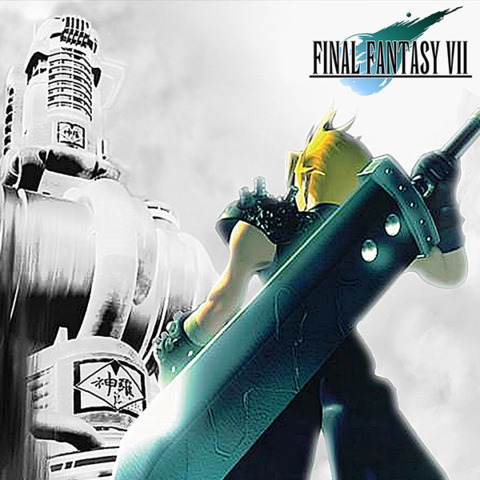
Masterlink: https://hartmonkey.tumblr.com/post/674955243020238848/a-complete-analysis-of-final-fantasy-vii
This is the first post in my chapter-by-chapter analysis of the entire Final Fantasy VII. Each chapter will be primarily based on the 1997 game, with discussion of the Remake and other entries in the compilation where relevant (ie. when they pertain to the original story). Aside from a spoiler-warning for the entire FF7 (this is the only warning I’ll give on that regard), I want to note a few things before we start.
Keep reading
-
 cocosmama26 liked this · 1 year ago
cocosmama26 liked this · 1 year ago -
 sefirosuu reblogged this · 2 years ago
sefirosuu reblogged this · 2 years ago -
 loregoddess reblogged this · 3 years ago
loregoddess reblogged this · 3 years ago -
 mootschi liked this · 3 years ago
mootschi liked this · 3 years ago -
 loregoddess liked this · 3 years ago
loregoddess liked this · 3 years ago -
 ineedabettername2124 reblogged this · 3 years ago
ineedabettername2124 reblogged this · 3 years ago -
 pewe reblogged this · 3 years ago
pewe reblogged this · 3 years ago -
 pewe liked this · 3 years ago
pewe liked this · 3 years ago -
 clotification liked this · 3 years ago
clotification liked this · 3 years ago -
 hartofhearts reblogged this · 3 years ago
hartofhearts reblogged this · 3 years ago -
 merry--jelly liked this · 3 years ago
merry--jelly liked this · 3 years ago -
 neneeroo liked this · 3 years ago
neneeroo liked this · 3 years ago -
 hartofhearts liked this · 3 years ago
hartofhearts liked this · 3 years ago -
 callmederok liked this · 3 years ago
callmederok liked this · 3 years ago -
 kirivee liked this · 3 years ago
kirivee liked this · 3 years ago -
 terra-fatalis reblogged this · 3 years ago
terra-fatalis reblogged this · 3 years ago

Hardcore FFVII fan sharing theories & fanart, sometimes silly stuff ⋆ AuDHD ⋆ She/her ⋆ INTP ⋆ Atheist ⋆ Non-native English speaker, be merciful with my odd way of writing ⋆ Twitter @TerraFatalis
234 posts